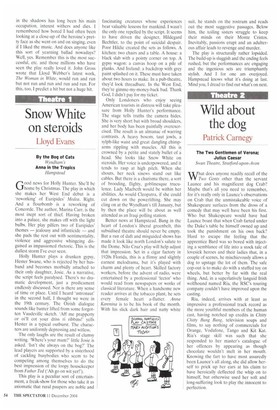Theatre 1
Snow White on steroids
Lloyd Evans
By the Boa of Cats Wyndham :s
Anna In the Tropics Hampstead
Good news for Holly Hunter. She'll be home by Christmas. The play in which she makes her West End debut is a 'reworking' of Euripides' Medea. Right. And a flourbomb is a reworking of Concorde. The author, Marina Carr, is the most inept sort of thief. Having broken into a palace, she makes off with the light bulbs. Her play pilfers two of Euripides' themes — jealousy and infanticide — and she pads the rest out with sentimentality, violence and aggressive whingeing disguised as impassioned rhetoric. This is the dullest storm I've ever seen.
Holly Hunter plays a drunken gypsy, Hester Swanc, who is rejected by her husband and becomes morbidly attached to their only daughter, Josie. As a narrative, the script feels paralysed. There's no dramatic development, just a predicament endlessly discussed. Nor is there any sense of time or place. Until I heard 'astronaut' in the second half, I thought we were in the 19th century. The Oirish dialogue sounds like banter lifted from some forgotten Vaudeville sketch. 'Aff me prapperty or oi'll cot your driss ri ribbins!' yells Hester in a typical outburst. The characters are uniformly depressing and witless.
The only laughs are the result of clumsy writing. 'Where's your mam?' little Josie is asked. 'Isn't she always on the bog?' The lead players are supported by a sisterhood of cackling busybodies who seem to be competing among themselves to do the best impression of the loopy housekeeper from Father Ted (Ah go on wit yer!').
This play is a peculiar sort of entertainment, a freak-show for those who take it as axiomatic that rural paupers are noble and fascinating creatures whose experiences bear valuable lessons for mankind. I wasn't the only one repelled by the script. It seems to have driven the designer, Hildegard Bechtler, to the point of suicidal despair. Poor Hildie created the sets as follows. A kitchen: two chairs and a table. A house: a black slab with a pointy corner on top. A gypsy wagon: a canvas hoop on a pile of planks. And Ireland: a backdrop with grey paint splashed on it. These must have taken about two hours to make, In a pub-theatre, they'd look threadbare. In the West End, they're gimme-my-money-back bad. Thank God, I didn't pay for my ticket.
Only Londoners who enjoy seeing American tourists in distress will take pleasure from Holly Hunter's performance. The stage tells truths the camera hides. She is very short but with broad shoulders, and her body has been painfully overexercised. The result is an almanac of warring contrasts. A heavy bosom, taut jowls, a sylph-like waist and great dangling chimparms rippling with muscles. All this is crowned by a petite and stately bullet of a head. She looks like Snow White on steroids. Her voice is underpowered, and it tends to rasp at high pitch. When she shouts, her neck sinews stand out like cables. But there is a charisma there, a sort of brooding, flighty, goblinesque truculence. Lady Macbeth would be within her abilities. As would Cleopatra, if she could cut down on the powerlifting. She may cling on at the Wyndham's till January, but by then the place will be about as well attended as an Iraqi polling station.
Better news at Hampstead. Bang in the heart of London's liberal greenbelt, this subsidised theatre should never be empty. But a run of daft and misguided shows has made it look like north London's salute to the Dome. Nib o Cruz's play will help adjust that impression. Set in a cigar factory in 1920s Florida, this is a flimsy and slightly earnest melodrama, but it's played with charm and plenty of heart. Skilled factory workers, before the advent of radio, were entertained by a professional 'lector' who would read from newspapers or works of classical literature. When a handsome new reader arrives at the tobacco plant, he sets every female heart a-flutter. Anna Karenina is to be his book of the month. With his slick dark hair and natty white suit. he stands on the rostrum and reads out the most suggestive passages. Below him, the toiling sisters struggle to keep their minds on their Monte Cristos. Inevitably, passions erupt and an adulterous affair leads to revenge and murder.
The play is structurally rather lopsided. The build-up is sluggish and the ending feels rushed, but the performances are engaging and the ingenious sets are triumphantly stylish. And I for one am overjoyed. Hampstead knows what it's doing at last. Mind you, I dread to find out what's on next.










































































 Previous page
Previous page